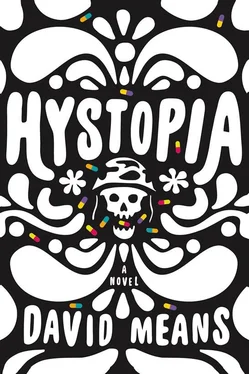“I know we went over it, the material about the girl named Meg, but it might help to go over it again. You might go out there with it into the Internal afternoon and think about it in another context. Who knows. Most of her file is sealed, of course. But let me reiterate what we do know, which is that Meg’s family was set to inherit part of the Upjack fortune, at least they were until the family lost everything. You familiar with Upjack?”
“Drugs,” Singleton told himself to say, and said. “The development of what they called the friable pill, a pill that wouldn’t dissolve until it reached the gut. That led to a patent. The patent led to great wealth. Scalp lotion. Ointments. Vitamins. And the serious antidepressants and, finally, Tripizoid, which was originally a veterinary product for horse sedation, a cure for the hoof-kick, for stable-knock, something like that.”
“Excellent,” Klein said. “It doesn’t seem to matter, unless it matters. If it matters, we’ll only know in retrospect. Her mother and father met on the train from New York to Michigan, somewhere along the water-level route. Most likely they sat near each other in the parlor car, along the Hudson, and conversed. Then, as I imagine it, they went to her sleeper car and had relations while the nighttime towns passed, little hamlets, houses down in dales, snow falling because it was winter, I’m guessing, and then they conceived a baby, and the baby was Meg. How do we know that they were on that train? Because one of the facts that was not redacted from her file was that she has a fear of trains. Is there a connection between Upjack and her trauma? Not likely. You get some strange connection, a link like the Tripizoid, but it has no meaning unless you try to make up the story to fit the facts, and we’re not in that business here. It’s in the Credo. All cures are bogus. Which I take to mean all stories are bogus. It’s impossible to find a causal connection between the end product, a cured patient, and the events that led to the originating trauma. In other words, the trauma seems to stand apart from the initial trauma when you look back in retrospect, after treatment. When you cure, you eliminate the cause. And when you eliminate the cause, you eliminate the sequence of events up to the trauma. The Corps has its own term for everything eliminated — which is?”
“The Causal Events Package. When you enfold the trauma, you must make sure you enfold the entire Causal Events Package,” Singleton said. He put his hands on his knees and leaned forward. Klein’s pipe hung from his clenched teeth. Behind his aviator-style glasses his eyes looked dazed with tedium. They’d been saying basically the same thing to each other for weeks.
“You’re not really paying attention,” Klein said. “You said to me that it was a Causal Events Package, and that wasn’t necessary. Even though I asked, I expected something more. Look, it’s late June and the cops are passing the buck, pinning every little shit-can murder on our target, which is only natural. You get some family scared shitless because they live — or think they live — in something called a Zone of Anarchy, and a Black Flag gang arrives one night revving engines, calling, waiting, until the man of the house comes out — because he has to come out eventually — and tries to sweet-talk his way out of what he knows is coming, or else he’s one of those guys with a lot of ammo but no luck who comes out shooting, and then one of the Black Flag men, fresh from one of those absurd battle reenactments up on Isle Royal, trying to relocate the glory and pissed off because reliving the glory has only made him want more glory, puts a bullet in the man’s head and kicks his skull in and leaves him to the local cops, a bunch of Barney Fifes who have no way to solve the case and don’t want to see it for what it really is — because why would they want to mess with the Black Flags? — so they wait until there are a few more killings. When they imagine a pattern, they pass word of a failed enfold to the liaison, and he comes up to my office with his briefcase and puts the pressure on me because that’s his job, and when I see his information I do a gut check and fail to find a pattern because there isn’t one. That’s how it works, again and again.”
“Yes, sir,” Singleton said. There was something in the hang of Klein’s jaw, a new tension. He fiddled with his pipes and then looked up, his eyes steely blue, fixed.
“Have you been fraternizing outside? That’s what I’ve been meaning to ask you.”
“Sir, I’m not fraternizing with another agent,” Singleton said.
“I didn’t think you were,” Klein said.
“Thank you, sir.”
“I was sure you were fraternizing.”
“Well, I’m not, sir.”
“When I was in Korea, I saw a man like me, I mean who I am right here, now, an officer in charge, and thought it was absurd that my life was in his hands. You don’t remember what you used to feel about your command over in Nam but I can assure you that when you saw a man with a West Point ring on his finger, some fresh change of command come walking up the trail in the Mekong with his spit-polished boots and his fresh shave and his baby face, you felt something akin to what you’re feeling about me right now.”
“Yes, sir. I thought you were in the big one, sir.”
“I said the big one, and for me the big one was Korea. It was just part of the Second, as a matter of fact. It was just an extension of the Second.”
“I see, sir,” Singleton said.
“When I start to feel the urge to recite poetry, I know we’re about done for the day. And I feel that urge. In that war you had a superabundance of highly educated men in the trenches carrying a working knowledge of Greek and Latin, reading Hardy and Dickens, filled with a desire to capture in words the way a sunrise or sunset looked from the bottom of the trench, or the way it felt to do a stand-to at dusk or twilight. All we’re getting from this war is the desire to write rock-and-roll lyrics.”
As he continued talking, tamping and lighting a second pipe, the sky in the window behind him seemed to clear (a perfect day to head to the beach with Wendy). Singleton continued doing his best to look like a trainee who still held the purest belief in Kennedy’s original vision of a Corps that would solve the problem of mental illness in general and the vast horde of returning vets in particular; a vision that honored the president’s sister, who sat somewhere alone and quiet with her brain lobotomized; a vision fueled by a man who had been shot in the shoulder and jaw (if a third term was good enough for Roosevelt, it’s good enough for Kennedy, the ads said).
Klein was rambling on about men who dragged Japanese heads on grappling hooks behind a ship, let the sharks clean flesh from bone, and brought them home as trophies. (There’s a photo in Life magazine, if you’d like to see it, he said.)
Singleton kept nodding as his mind drifted, and he imagined what it would be like to go downstairs into the lobby and openly embrace Wendy. She would kick up her heel and throw back her head and open her mouth and, for a moment, they would strike the pose of a sailor and a lover on V-J day in Times Square, dancing (he imagined) on the seal of the Kennedy Psych Corps.
Klein was still talking, something about the photograph, the one with the skulls — was he offering it to him, a kind of gift? — and again Singleton drifted, remembering — what? — remembering how it felt to run with his arms waving in the air, leaving the schoolhouse, out into the freedom of afternoon, wrapped in the sound of kids shouting around him, free for the rest of the day (no, for the rest of the summer) until he got back to the house, back to his old man, home from the mill, shoulders sagging. It was the only memory he had, everything after that moment — leaving school — came up blank and here was Klein, he was still talking, pressing, asking him what he was thinking about, so Singleton said, “The Credo, sir, I was thinking about the Credo,” while in his mind he was running out of the Corps building and Wendy was waiting, arms wide, and then he was on the beach with her, applying lotion as an excuse to touch her back, two fingers pressed together tracing the lovely line of her spine to where the taut band of her bikini bottom stretched over a slight gap that absorbed sunlight like antimatter. The shimmer of sand and water and light were the backdrop for the only thing in the state worth looking at, worth pondering, that bit of darkness showing beneath her bikini’s band — its cavelike perfection leading to the rest of her body — and his own ardor in relation to boredom (maybe the right word was freedom ), the two combining in the afternoon light, and the fact that all he wanted — Klein was giving him a cold stare — was for ardor to win.
Читать дальше












